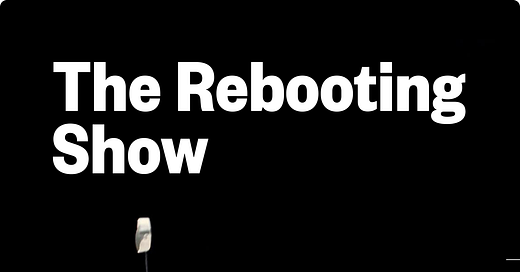Check out the full episode on Apple Podcasts or Spotify. Let me know what you think: bmorrissey@gmail.com.
The war in Ukraine is now six weeks old, likely to drag on even longer. It’s important to consider how vital an independent and free media is to a free and independent Ukraine. I visited Kyiv in the fall, and I wrote about how the media operates in a far more complicated context there than in a place like the U.S.
This challenge got greater in the wake of an invasion that’s mostly ground the economy to a halt. Andrey Boborykin, executive director of news outlet Ukrayinska Pravda, told me on this week’s episode of The Rebooting Show that the independent news media in Ukraine for now must rely mostly on grants from foundations and individual contributions from abroad. (Ukrayinska Pravda is also now publishing in English.)
“We are in a very tough position when we speak about reader revenue, because here we are competing with expenses for food and transport and utilities,” he said. “We don’t have the culture of people paying for content.”
We spoke about his own experiences being displaced in Ukraine twice, as well as how Ukrayinska Pravda is continuing its operations. I wanted to have Andrey on to bring attention to the threat to sustainable and independent media in Ukraine. Andrey and Eugene Zaslavsky of the Ukraine-based Media Development Foundation have set up a local news emergency fund to help independent media in the country get over to the other side of this tragedy.
The institutional-individual divide
The shift from institutions to individuals is happening in many areas of the economy and society. The Economist noted that influencers were “initially dismissed as credulous Gen-Z folk who had mistaken posting selfies for having a job” rather than being the entrepreneurs they are. The same is happening as the media business itself goes through a reorganization that shifts more power to individuals. Dean Baquet’s get-off-Twitter missive to his newsroom can be seen in this light. Reporters should be out reporting, not tweeting all day and having their viewpoints trapped in the Twitter bubble, not to mention the fact that many NYT journalists are “bad at Twitter.” (Starting a Twitter fight is like engaging with a mascot at a sporting event: Impossible to emerge from the encounter looking good.) The Times is in a unique position to be able to set its own expectations as a brand that employs individuals. Other publishers will have a tougher time.
The return of Covid (again) and events
Surprise, Covid is back — well, it never went away. Case numbers have been spiking in Europe, and they’re starting to rise again in many places in the U.S. The Gridiron Dinner, a regular social gathering of Washington powerbrokers, turned into something of a superspreader event, with dozens coming down ill, including three cabinet officials. Covid is different post-vaccines and post-Omicron. Yet it still lurks and kills hundreds every day in America, particularly those who are more vulnerable. My instinct is that a new surge will not damper the return to in-person gatherings after so long. Many (if not most) people have decided to simply calculate risk factors and mostly return to normal life while taking sensible precautions. For events organizers, the question is beyond mitigation: Is there a reputation risk to hosting an event that spreads illness, even if Covid tends to be far less lethal now compared to a year ago? One event organizer I spoke to this week said their event in Europe led to 30-plus Covid cases, including staff, but they didn’t field complaints since attendees made the informed choice to take on the risk but gain the benefits of in-person interaction.
Verbatim
“Whenever I’ve worked at big legacy places I’ve always had my wings clipped,” Ioffe said in an interview. “I start tripping over my feet at places like that. I’m not very good at playing internal politics and managing bureaucracies and figuring out who to CC on an email. I just want to do what I’m good at, which is reporting and writing.” - Julia Ioffe on joining Puck
Recommended
I spoke to Charlotte Henry of The Addition about the media gold rush set off by the legalization of sports gambling in the U.S. market. It’s unique to have a situation where a new industry springs up seemingly overnight. Cannabis has some similar dynamics, but so too does crypto. Media might not be a great business on its own, but it remains a very good customer-acquisition tool for businesses with high-value customers.
McKinsey is a great example of this in action. I was surprised to learn from my former colleague Shareen Pathak of Toolkits that the consulting firm has 70 people in its content operation.
The adversarial web bothers everyone. I’m betting on publishing changing mostly because nobody seems very happy with its current state, even those in the business. TRB reader and old friend Ari Rosenberg has a reminder that “the emperor has no clothes” (still) when it comes to treating audiences with respect and making good products.
I hope more European publishers target the U.S. Le Monde is expanding its English-language publishing with an eye on both the U.S. and UK markets. With plans to publish 70 English-language articles per day, this is a much more ambitious effort than the dabbling many non-English language European publications have done. In the U.S. market, we could use a European perspective.
If you’re into newsletters, SparkLoop understands the dynamics of growth. Co-founder Louis Nicholls is sharing some of those insights with his Send & Grow newsletter and podcast. (This isn’t an ad, although I do tell Louis he should sponsor The Rebooting.)
I did a Twitter Space with A Media Operator/Morning Brew’s Jacob Donnelly on Friday. Check it out.
Thanks for reading. If you’re finding The Rebooting valuable, please share it with a colleague. Also, send a me a note with feedback: bmorrissey@gmail.com.

















Share this post